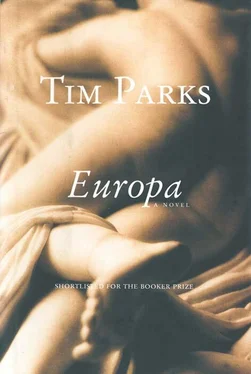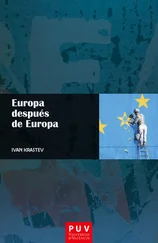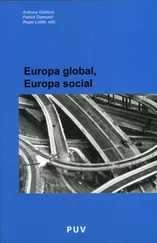Tim Parks - Europa
Здесь есть возможность читать онлайн «Tim Parks - Europa» весь текст электронной книги совершенно бесплатно (целиком полную версию без сокращений). В некоторых случаях можно слушать аудио, скачать через торрент в формате fb2 и присутствует краткое содержание. Год выпуска: 1999, Издательство: Arcade Publishing, Жанр: Современная проза, на английском языке. Описание произведения, (предисловие) а так же отзывы посетителей доступны на портале библиотеки ЛибКат.
- Название:Europa
- Автор:
- Издательство:Arcade Publishing
- Жанр:
- Год:1999
- ISBN:нет данных
- Рейтинг книги:3 / 5. Голосов: 1
-
Избранное:Добавить в избранное
- Отзывы:
-
Ваша оценка:
- 60
- 1
- 2
- 3
- 4
- 5
Europa: краткое содержание, описание и аннотация
Предлагаем к чтению аннотацию, описание, краткое содержание или предисловие (зависит от того, что написал сам автор книги «Europa»). Если вы не нашли необходимую информацию о книге — напишите в комментариях, мы постараемся отыскать её.
Europa — читать онлайн бесплатно полную книгу (весь текст) целиком
Ниже представлен текст книги, разбитый по страницам. Система сохранения места последней прочитанной страницы, позволяет с удобством читать онлайн бесплатно книгу «Europa», без необходимости каждый раз заново искать на чём Вы остановились. Поставьте закладку, и сможете в любой момент перейти на страницу, на которой закончили чтение.
Интервал:
Закладка:
Dimitra banged through the double doors, almost knocking over the Welsh MEP’s secretary. Distraught and tight-lipped, she raced down the shallow steps of banked seats, skipping and stumbling, until finally she threw herself against the battleship table at the front.
Ine fovero , she screamed, her voice only half amplified in the directional mikes. Aftoktónisse. O trelos! Aftoktónisse, O theotrelosl
Sobbing for breath, her big breasts pressed and heaving against the desk, Dimitra shouted these words, and ‘others, two or three or four times, apparently not understanding why we didn’t understand, until the tall, lean member of the Petitions Committee in the front row hurriedly pulled off his headset and in a heavily accented English demanded, Who has hanged himself? Where?
CHAPTER ELEVEN
Vikram Griffiths lived alone in a dilapidated third-floor apartment in Via Pastrengo. But roomy. Thus I describe to myself my colleague, my acquaintance, sitting here with my bag beside me in the Meditation Room of the European Parliament. He did not die with the lectors’ petition pinned to his tweed jacket as this morning’s European claimed. Nor was the petition signed by more than a thousand names. Pastrengo was a battle, as I recall. Another Napoleonic triumph. Unless that was Marengo. Or both. When I phoned his wife — I think both — she asked was this what the British called a practical joke?
But to say he lived alone is to give the wrong impression. Everybody on the coach returning from Parliament to hotel was eager to rehearse, in lower voices than before, though the driver had not forgotten to turn the radio on, their memories of Vikram Griffiths. And for most these focused around the time they had rejected, or in one or two cases accepted, a pass from him. For the men it was a question of recalling times they’d got blind drunk and he had told his life-story before they fell asleep on his floor. Only two men said Vikram made passes at men as well as women. It is inexplicable, I thought, travelling back to the hotel on the coach, how strong my desire for Georg is. How much I wish that he were here. He made a pass at me last night, she said. Most of the women remembered he went quite brutally for the hand up the skirt. And they laughed about it, as if it were a minor and indeed endearing misdemeanour. He’d had a couple of drinks, one student explained. But when had he not had a couple of drinks? And she said, If only I had accepted, last night, perhaps none of this would have happened. She had tears in her eyes, speaking to four or five people, and her accent was more French than ever. The Ys, the Ts. Why on earth didn’t I accept? she said. Because you were fucking Georg, most probably, I thought, before he was called away to the mother of his child. A cordial fuck, I thought. How can I wish so hard that he were here? But I do. I like Georg, it occurs to me now. We were good friends after all, she was saying. What difference would it have made? I should have gone to bed with him, she said, apparently with real remorse at a generous deed undone. Then she said we must make a collection for Vikram’s widow and his orphaned child. We must make a collection. Though the two were not connected. She wanted to find a hat or something there and then and make a collection, in the coach on the way back from the Parliament only a couple of hours after the body had been found. It would be important for her to see she had our solidarity, she said, even though they were engaged in acrimonious separation proceedings, even though the second wife had apparently testified on behalf of the first in their bitter child-custody battle. And she actually began collecting money, holding out a small plastic bag of the variety they put cheese and sliced meats in at. the supermarket. She began to go up and down the aisle of the coach as it drove around the Strasbourg ring road to our remote and cheap hotel with its cheap reproductions of modern masterpieces. Goya’s Executions perhaps. You could see into her cleavage when she bent over. Guernica even. She knew it. Her black dress was quite short above her slim knees. The poor woman will be frantic, she said. Her heels dug the purple carpet of the aisle. It’s the least we can do, she said, bending over Colin with her plastic bag. Everybody was eager to give, as befits people who have lost a friend and leader. But nobody had any currency. What with the collapse of the Lira, the decisions of the Bundesbank. Better to wait till we’re back at the University, Barnaby Hilson said. A student asked where the dog was. We should start a fund , the Irish novelist said. Certainly the creature wasn’t in the coach. Doris Rohr promised to give generously, though she was apparently the only female lector Vikram Griffiths had never made a pass at. He seemed so full of fun last night, Plaster-cast-tottie said. Sitting beside her, the Avvocato Malerba said there were special rules for setting up funds of this kind and he would be glad to sort out the legal side.
No, to say that he lived alone, I reflect, sitting in the tiny Meditation Room of the European Parliament with its thick blue carpet, its disturbing plexiglass mural backlit with neon, its odd white lectern — to say that he lived alone would be as misleading as to say that his first wife was a psychopath. Though he himself liked to use these words. I live alone, he would say, my first wife is a psychopath. He liked their drama. Vikram Griffiths was addicted to drama, I reflect, as he was addicted to drink. And to public meetings. He was addicted, perhaps, to the nervous coercive fervour of drink-inspired drama. His second wife was a witch, he said. And I reflect that it wasn’t so much a good decision, on my part, not to return to Milan on the coach with the others, as a necessary decision. An imperative . You could not have returned on the coach to Milan with the others, I tell myself. It was impossible. You simply could not have climbed up the steps of that modern coach and worked your way down the purple aisle between the blood-red seats to the back. You would have vomited. Barnaby Hilson playing Irish laments on his tin whistle. Or Men of Harlech perhaps. Colin recalling what an extraordinary tottie-man Vikram was. At some point you would have vomited. But then by the same token, I reflect, you could not have not come on this trip in the first place. That too was impossible. To climb on the coach and set out for Strasbourg was an imperative, I reflect, just as now not to climb on the coach for the return to Milan is an imperative. So there was no merit in my obeying this more recent imperative, I tell myself, in my deciding that I would die, that something inside me would die, if I stepped on that coach for the return journey to Milan, to the University, to the Vikram Griffiths Memorial Fund, if I had to listen to Barnaby Hilson’s Irish laments, on a variety of tin whistles, and perhaps some sad cross-reference to the narrative astuteness of the suicide in Dead Poets Society , Or to a further discussion of the spy. The spy! Vikram Griffiths didn’t live alone, I thought, there on the coach driving back to the hotel for another night with Picasso’s lovers. And he certainly didn’t kill himself because Robin Williams had urged him to carpe diem but his parents wouldn’t let him go to drama school. I should never have made that ridiculous speech, I thought. I made a perfectly ridiculous, sublimely hypocritical speech to the Petitions Committee of the European Parliament, a speech worthy of the very best drama school, and I even felt proud of myself, I remembered, and powerful, and on for it , and this precisely as Vikram Griffiths was knotting two ties round his thick neck. Beneath his stubborn chin. Vikram Griffiths carped the diem every day, I thought. He didn’t live alone. Almost every day he brought someone back to his dilapidated, unheated apartment rented to him by the husband of an ex-mistress (in her late fifties) who couldn’t afford to renovate. Quite apart from the parentheses of his marriages, the safer company of his dog. It was, it is, a beautiful apartment. It has ancient oak beams and the remnants of frescoes, but at the last stage of dilapidation, as only apartments in Milan can be. The only time I visited him there, I remember, after the first wife, before the second, we were drinking beer on sofa cushions and after about half an-hour a tiny girl he had made no mention of emerged from the bathroom in a robe too long for her. A tiny girlie. Plus the grandmother he boasted paid him to shag her. Money helps you get it up, he boasted, when he’d had a lot to drink. But when had he not had a lot to drink? Though on every issue bar women he was political correctness itself. He was the revolution permanente in person, Vikram Griffiths. He would have agreed with her about the children of Bosnia, I thought. And here in the Meditation Room beside my packed bag it occurs to me that his decision to kill himself wasn’t a decision, perhaps, but, like mine, an imperative. For some reason he had to kill himself, as for some reason I knew that I could not step on that coach and face the journey back to Italy, beside Doris Rohr, or Sneaky-tot-tie, or beside Colin saying perhaps that Vikram Griffiths should be remembered not just as a tottie-man but as a tottie-master . There is no merit in choosing to do something, if the decision is imposed upon you, I tell myself. No merit at all. But on the other hand it is ridiculous at the point I’m at to be worrying about merit. To be constantly judging what I do. Why on earth should I care about accruing merit? After making a speech like that. But now I recall that she also said, She couldn’t help herself. He phoned so often, she said, and sent so many flowers, how could I refuse? She also claimed the excuse of the imperative. Perhaps there is merit, thee, it occurs to me, in the kind of imperatives we impose upon ourselves. But it is ridiculous to hear yourself talking about merit after abandoning your wife and daughter, I tell myself. The Greeks, I reflect, understood these things better than us. Only the gods can be causes. Thus Priam to Helen at the Scaean Gate as Troy fell. Only the gods. Unless it’s a question of health, perhaps. Your decision not to go back on the coach, I tell myself, should perhaps be seen as a more healthy decision than hers to sleep with a man just because he insisted so much, than Helen’s to run off with Paris, than Vikram Griffiths’ decision to knot two ties around his thick neck beneath his theatrical sideburns. A more healthy imperative. But how can someone who lives in your state of mind talk about health! Someone whose head is a constant fizz of contradictions. It’s laughable. You promised not to make comparisons, I remind myself. Comparisons are pernicious, you said. Helen of Troy and Vikram Griffiths! As the coach pulled into the parking-lot of the hotel, I asked Doris Rohr how old exactly Vikram was. She didn’t know, but Dimitra in the seat behind said, Forty-five.
Читать дальшеИнтервал:
Закладка:
Похожие книги на «Europa»
Представляем Вашему вниманию похожие книги на «Europa» списком для выбора. Мы отобрали схожую по названию и смыслу литературу в надежде предоставить читателям больше вариантов отыскать новые, интересные, ещё непрочитанные произведения.
Обсуждение, отзывы о книге «Europa» и просто собственные мнения читателей. Оставьте ваши комментарии, напишите, что Вы думаете о произведении, его смысле или главных героях. Укажите что конкретно понравилось, а что нет, и почему Вы так считаете.












